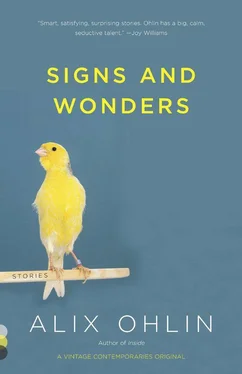Alix Ohlin - Signs and Wonders
Здесь есть возможность читать онлайн «Alix Ohlin - Signs and Wonders» весь текст электронной книги совершенно бесплатно (целиком полную версию без сокращений). В некоторых случаях можно слушать аудио, скачать через торрент в формате fb2 и присутствует краткое содержание. Год выпуска: 2012, ISBN: 2012, Издательство: Random House, Inc., Жанр: Современная проза, на английском языке. Описание произведения, (предисловие) а так же отзывы посетителей доступны на портале библиотеки ЛибКат.
- Название:Signs and Wonders
- Автор:
- Издательство:Random House, Inc.
- Жанр:
- Год:2012
- ISBN:9780307948649
- Рейтинг книги:3 / 5. Голосов: 1
-
Избранное:Добавить в избранное
- Отзывы:
-
Ваша оценка:
- 60
- 1
- 2
- 3
- 4
- 5
Signs and Wonders: краткое содержание, описание и аннотация
Предлагаем к чтению аннотацию, описание, краткое содержание или предисловие (зависит от того, что написал сам автор книги «Signs and Wonders»). Если вы не нашли необходимую информацию о книге — напишите в комментариях, мы постараемся отыскать её.
Signs and Wonders — читать онлайн бесплатно полную книгу (весь текст) целиком
Ниже представлен текст книги, разбитый по страницам. Система сохранения места последней прочитанной страницы, позволяет с удобством читать онлайн бесплатно книгу «Signs and Wonders», без необходимости каждый раз заново искать на чём Вы остановились. Поставьте закладку, и сможете в любой момент перейти на страницу, на которой закончили чтение.
Интервал:
Закладка:
Beth, similarly, began to bite. She called Fowler and begged him to come back, and when that didn’t work, she harangued him. She told him the children missed him, involving them in a way she’d sworn she’d never do. She told him he was being irresponsible, distant, uncommitted, sounding like an article in a women’s magazine. Fowler would come over for dinner, but didn’t spend the night, and then he came over less and less often. He was more comfortable in his hovel, in his Platonic cave.
She blamed him. Of course she did. She told herself and all her friends that he valued ideas more than people, that he’d taken advantage. “I think he’s almost autistic, ” she told them, and her friends nodded sagely.
One day she realized she hadn’t heard from or spoken to Fowler in a week, and she knew it was over. She felt exiled from a country she’d once been a citizen of. When her children asked her where he was, she lied. “He had to go back to Africa,” she said. “They missed him there.”
Reports of Fowler filtered down to her every once in a while. He’d been seen with a divorced real estate broker whose own house had many extra rooms. He’d arrived drunk at a dinner party and announced that he no longer ate meat. Later someone caught him standing over the stove, spooning cassoulet into his mouth.
“Fowler,” said the woman who told her this story, shaking her head.
Once Beth saw him on the street, too far away to wave at, his long hair tousled in the wind. He crossed her mind all the time, then only occasionally. But he never disappeared completely. Instead he shrank to a figment of himself, partial and pale, stored on the shelves of her brain. He was a thought that cluttered the night, an idea once held close, now scattered and gone.
Who Do You Love?

Adam Leavitt fell in love with me two weeks before our college graduation, and I never knew what brought it on. One minute we were part of the same group of friends, loosely bound by the parameters of dining hall tables and Saturday night parties, and the next thing I knew he was staring at me with the intensity of a lion stalking its prey. He was a musician, and intensity was his thing. He had curly blond hair that fell in ringlets over his eyes, and he wore the same outfit every day: jeans, motorcycle boots, and the piercing, blue-eyed gaze of a man with heartbreak and death on his mind. He staged solo performances in boiler rooms. He had a tattoo of a Chinese symbol on his arm (this was back before every sorority girl had a dainty one etched on her lower back) and another on his neck, some kind of mythological animal, its claws reaching up toward his ear.
One night I went over to his room to borrow a book and he’d lit at least twenty candles in this tiny room that could barely contain a futon — a fire hazard if I’d ever seen one. He handed me the book, his blue eyes glowing radioactively. I thought, Why me? I felt like there might be a hidden camera or somebody behind a curtain waiting for me to fall for this prank.
“Janet,” he said intensely. I worried there was going to be a romantic speech. Let me give you some context. This was the early nineties, at Harvard, in a dorm where we all wore black turtlenecks and thought we understood Derrida, or thought that a display of understanding Derrida was important. I had friends who stayed up all night discussing whether all penetration was rape. There was a couple whose abusive S & M relationship was considered by some to be a radical subversion of the heteronormative paradigm. We were serious about these things. There was no place for romantic speeches in our world.
I grabbed the book and said, “Sorry, I have to go.”
After we graduated and I moved to New York, he sent me a postcard, a black-and-white photograph of himself, unsmiling, glued to a piece of cardboard. On the back it said, Thinking of you, wishing you well. What it meant, I understood, was I’m over it, good-bye.
Eventually I left the city, went to graduate school in the Midwest, and then moved back again, this time as an organizational psychologist. While in grad school I’d met and married my husband. All the French theory in my head had evaporated when I graduated from college; I’d come from middle-class suburbia and those were the values I returned to, undergraduate philosophy sliding off me like the extra pounds from dining-hall food and Everclear punch. My husband had attended a state school where they hadn’t waded knee-deep in identity politics and irony. He professed his love to me in an e-mail, after a chatty message about some repairs he was having done on his car. He was forthright and direct. PS, he wrote, I love you.
In person, this became his thing. At the end of a phone call: “Well, I’ve gotta go,” he’d say. “PS, I love you.” Sometimes he’d even hang up, then call back to say it.
After the wedding, he joined an Internet startup that was targeted immediately by enthusiastic investors, and all of a sudden we were floating in money. We had salaries and stock options and a brand-new car. My husband began speaking in acronyms. I’d thought PS was cute but it turned out to be the tip of the iceberg. He had code for everything. BRB, he’d say when he was going to be right back. IMO, when offering an opinion on current events.
One night, at a dinner party, I heard him say, “LOL!” He wasn’t laughing, or even talking about it using real words; he was using the code for laughing instead of just chuckling, as if throwing back his head and laughing would be too much trouble, and take too much time. What would Derrida say about that? I wondered. It made me hate him — my husband, not Derrida.
You might think it’s a small thing, the use of Internet-derived acronyms in ordinary conversation, and of course you’d be right. But it became an emblem of everything about my husband’s new and prosperous and grown-up self that I didn’t recognize. And it swelled up right in front of me, inflating like a balloon, until it obscured everything that had once drawn us together. My irritation was so gigantic it filled the horizon; it made me miserable every single moment of every single day, and soon enough, so was he. What kind of love is this, I thought, that can be eclipsed not by infidelity or loss but by irritation? What kind of person am I? We got divorced.
· · ·
My husband cashed out his stocks before the Internet bubble burst, we sold our car, and he moved to California. I stayed in New York, the city’s hard times seeming entwined with my own. After a while people asked me when I was going to start dating again, but truthfully I couldn’t get interested. It seemed to me that I wasn’t relationship material, that all those dreams I’d had back before getting married — of a house with a yard, a life with children, a couple growing old together — were meant for other people, not for me, in the same way that I just can’t wear orange. Sometimes my husband and I talked on the phone, and we were friendly, solicitous, but our failure hung in the air between us, even across thousands of miles. I still thought of him as my husband, not because I still wanted to be married to him but because he was the person I’d chosen to marry, and the subsequent collapse didn’t change the facts. Our failure made me more of an adult than getting married had. I was thirty-six but felt middle-aged, as if the best I could hope for was to maintain. I spent my disposable income on facials and manicures, grooming my carapace, which was how I thought of my body, something to be buffed and polished but never used, like a car in a showroom, gleaming inside glass walls.
Читать дальшеИнтервал:
Закладка:
Похожие книги на «Signs and Wonders»
Представляем Вашему вниманию похожие книги на «Signs and Wonders» списком для выбора. Мы отобрали схожую по названию и смыслу литературу в надежде предоставить читателям больше вариантов отыскать новые, интересные, ещё непрочитанные произведения.
Обсуждение, отзывы о книге «Signs and Wonders» и просто собственные мнения читателей. Оставьте ваши комментарии, напишите, что Вы думаете о произведении, его смысле или главных героях. Укажите что конкретно понравилось, а что нет, и почему Вы так считаете.












